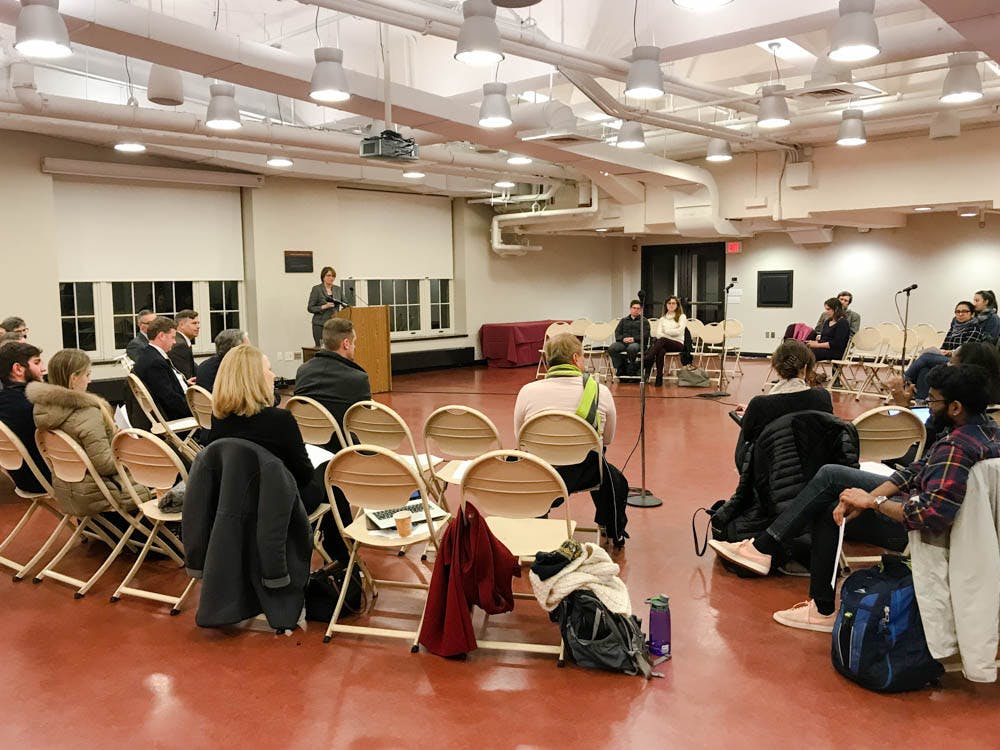The University is actively lobbying against the higher education-related portions of proposed tax reforms in the House and Senate, said President Christina Paxson P’19 at the Brown University Community Council meeting Tuesday.
“There are a number of provisions in (the two bills) that are harmful to higher education,” said Albert Dahlberg, assistant vice president for government and community relations. Those proposals include an endowment excise tax in the Senate bill and elimination of the graduate student tuition deduction in the House bill, The Herald previously reported.
The excise tax could cost the University between $3 million and $6 million, while the House bill’s elimination of the graduate student tax deduction could add another $20 million to that total, said Provost Richard Locke P’18.5. Other line items in the bill would also negatively impact the University, he added.
The government relations team and the advancement office have pressed influential alums and Corporation members to direct lobbying efforts at senators and representatives from the states of Indiana, Texas, Missouri and North Carolina, said Steve Gerencser, assistant director of government relations. Gerencser’s office has also partnered with schools such as DePaul University and Wabash College to secure signatures for a letter to Sen. Todd Young, R-IN, he added.
“A big part of our advocacy efforts (is) reaching out to Republicans,” since Democrats will most likely not play a role in the bill’s passage or failure, Gerencser said, adding that “alumni are very eager to get involved.”
“We’re asking these senators to have a conversation with Senate leadership … and ask that the endowment tax be removed from the Senate version,” he said. “The Senate version is more preferable to us” because the graduate student tuition assistance exemption and other deductions would remain in place, Gerencser said.
The Senate Budget Committee voted to move the bill to the Senate floor for consideration Tuesday evening, Gerencser said, adding that a full vote will most likely occur sometime Thursday or Friday.
The House and Senate have two options in order to finalize a bill for President Trump’s signature. If the Senate bill passes, they could meet in conference to reconcile the two bills, or the two houses could agree that senators will amend the bill on the floor and then send it back to the House for approval, Gerencser said.
“We’re waiting to see what happens with the Senate bill,” because there will be another round of advocacy if the two bills move to reconciliation, he added.
If any of the higher education-related provisions remain in the final bill, “it will be very difficult for us” to fill the gaps, Locke said. While the University has begun to reduce the yearly endowment payout to ensure fiscal responsibility, the process could regress to compensate for the deficits that the bill would create, he said.
“If it seems that we can’t change the actual provisions, we’ll work to change the effective dates … to give us more time to work things out,” Gerencser said.
Paxson also addressed the administrative move to South Street landing and the Brown Promise initiative at the end of the meeting.
Brown Promise aims to eliminate loans from all financial aid packages, which “would apply to all domestic as well as international undergraduate students,” she said. “I’m very optimistic that we’ll be able to meet this goal and go no-loans starting next year.”
BUCC members also voiced their approval for the new South Street landing administrative building. “Being at South Street landing with colleagues really makes you feel like you are part of a larger enterprise,” Dahlberg said.





